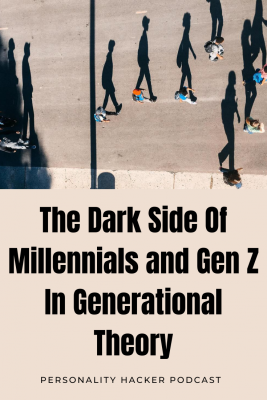Download Episode Here – right click link and select “Save Link As…”
In this episode of the Personality Hacker podcast, Joel and Antonia chat with INTP media producer and art director Christian Rivera about the generational shadow of Millennials and Gen Z.
————————————————
In this podcast you’ll find:
- Co-host Christian Rivera joins.
- How generational archetypes are defined and divided.
-
Why Millennials and Gen Z are the inverse of Gen X and Baby Boomers.
- What are generational shadows?
- How do Millennials view Baby Boomers?
- The unique challenges Millennials face – and how they handle them.
- How have previous generations shaped Millennials during their childhood?
- Some thoughts on Millennials’ social persona.
- What are Millennials like as parents?
- How are parents today losing their authority?
- The downside to the non-committal nature of our younger generations.
-
Why mentorship should be important to Millennials.
- A note on personal responsibility.
- Which archetype fits Gen Z and which previous generation do they share this with?
-
Summarizing the Gen Z mindset.
- How do they communicate their ideas?
- Using gaming culture to illustrate the differences between Millennials and Gen Z.
- What motivates Gen Z?
- How Gen Z are emerging as adults.
- How can you use generational theory as a tool?
To subscribe to the podcast, please use the links below:
Subscribe with iTunes
Non-iTunes Link
Soundcloud
Stitcher
Google Play
Spotify
Radio Public
PlayerFM
Listen Notes
If you like the podcast and want to help us out in return, please leave an honest rating and review on iTunes by clicking here. It will help the show and its ranking in iTunes immensely! We would be eternally grateful!
Want to learn more?
Discover Your Personal Genius
We want to hear from you. Leave your comments below…



Share:
The Dark Side Of Boomers and Gen X In Generational Theory | Podcast 0471
Unlocking Your Personality Flow State | Podcast 0473
12 comments
That is very cool that your 12 year old listens in. Thanks for sharing Jessica.
Eliana, this is such a thoughtful and engaged answer! I’m nine years older than you (1996), which means I should be a Millennial, but I really resonate with that fakeness and overwhelming desire to lie to ourselves or others about who we are in order to succeed (whether that’s at fitting in or trying to be more successful). It is such a tricky and exhausting balance. I also think that, as a young person who’s totally saturated in the tensions and conversations about generational/political/cultural/economic/racial/moral differences, it can be hard to find yourself in those arguments except that you’re the ones being talked about, rather than included. I do think youth has a part of it, and so I’m curious how Gen Z will interact with the world once they/we are older and others see us as experienced/educated enough to have an opinion worth listening to.
Thank you Catlyn for sharing.
As a person that’s a part of Gen Z (born in 2005), I feel like there’s a general mindset of I need to survive. There’s a lot of doing whatever works best for you or whatever gets you to your goal. I’ve seen this show up as a widespread acceptance of dishonest acts. So partaking in dishonest acts or turning a blind eye to it. There’s an acceptance of dishonesty because we think that’s the only way to survive, because we think that everyone is dishonest. Obviously people can incorporate dishonesty in all sorts of ways. I’ve seen it manifest in people who always slack off, steal, cheat, use their peers, and lie. Maybe it’s just my age, but I’ve especially witnessed people being straight up fake. It’s like they’ll do whatever it takes to get to some perceived higher social status. That’s why Gen Z is so collaborative while also being competitive. Because they’re really just competitive and pretending to be collaborative so that they don’t have to work as much, or so that they gain status.
As for Gen Zs disliking millennials, I think that’s partly true. Of course there’s always exceptions, but I think a lot of Gen Zs have been the objects of millennials’ shadow projections. Put another way, millennials project a sense of authority onto younger people, just to turn around and act clueless. So I think there’s a general feeling of frustration and distrust. Kind of like how millennials experienced a feeling of betrayal and deception from Boomers, it seems like Gen Z and millennials have that relationship. Millennials trusted Boomers and saw that the system was actually faulty, and Gen Z trusted millennials and then found out that the words they were trusting were empty.
Maybe this is just my experience. I have a millennial sister (ESFJ) and I was constantly lied to and told what to do, but not out of consideration. It was like I was a test subject. I understand how that can be an immature ESFJ thing, but it was that way with other millennials too. I feel like there’s a sense of Gen Z being the annoying little sibling that you don’t want around. Hence why lots of people are so obsessed with personalization and being unique. Like standing out and being admired is a part of surviving. Or maybe I was just an annoying little kid, who knows?
I think the way Gen Z should reconcile their shadow is by realizing that they don’t have power over whether or not they “survive.”Ultimately, they can’t control that. So they should turn their focus to being good, honest people because they understand how it feels to be used and stomped on.
So, advice I have for parents is to model what you want to see. You can teach your kids whatever you want, but at this point in time, your voice is going to be battling against thousands of other voices in the world. If they have experiential proof that what you say has value because you modeled it for them, that’s how they’ll know they can trust your voice.
As for the “what’s in it for me?” question, don’t shy away from explaining why you want them to do something. If you don’t have a good explanation, is it possible that your in a bad mood and just being bossy? This comes back to what I was saying earlier with millennials bossing Gen Z around. I personally have experienced not wanting to do something unless I know why and agree. If I don’t understand why I’m doing something, I don’t trust that it needs to be done. And if it needs to be done, I want a say on how it gets done.
Okay that’s a lot. Hopefully something in there makes sense or is helpful.
Thank you Eliana for sharing your perspectives and experience with us.